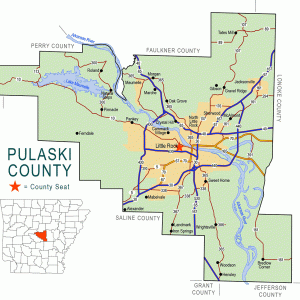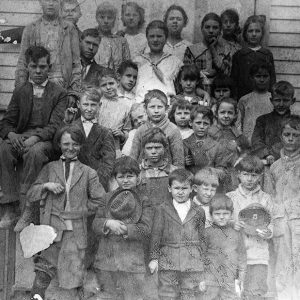calsfoundation@cals.org
Roland (Pulaski County)
Roland is an unincorporated community north of Pinnacle Mountain State Park in western Pulaski County, not far from the Arkansas River. It is crossed by State Highway 300, part of which is a component of the Arkansas River Trail, a pedestrian and bicycle trail that goes through Little Rock (Pulaski County) and North Little Rock (Pulaski County). Once a stop on the Rock Island rail line, Roland is home to nearly 750 residents; its post office also serves nearby Natural Steps (Pulaski County), as well as many rural residents and businesses in the area.
The Roland post office was established in 1884, several years before the arrival of the railroad. Although the origin of the name is unknown, the post office most likely was named for the first postmaster, who may have owned a store in western Pulaski County. The Goodspeed accounts of Pulaski County from that decade make no mention of the community.
In 1898, the Choctaw, Oklahoma and Gulf Railroad purchased the Little Rock and Memphis Railroad. It then built a line, completed by 1900, connecting Little Rock to its lines in Indian Territory (present-day Oklahoma). Roland was one of the stops on the 151-mile-long line. In 1902, the Chicago, Rock Island and Western Railroad gained control of the line, operating it in spite of several financial crises until the railroad finally went out of business in 1980. Since then, the rail line through Roland has been operated by Little Rock and Western Railway.
Railroad operations and lumber businesses brought many immigrants into Arkansas. Five Italian families that had settled in Illinois and Michigan relocated to Arkansas around 1915, establishing the community of Little Italy on the county line between Pulaski County and Perry County. The cemetery for their church, St. Francis, was established in Roland on land donated by John Segalla.
In 1956, the Big Maumelle River was dammed west of Roland, creating Lake Maumelle, which is the source of drinking water for many Pulaski County residents, as well as a recreational area for boating and fishing (although swimming is not allowed). Rocks from nearby Pinnacle Mountain were used in the construction of the dam. To preserve the remaining mountain and wilderness, the Arkansas General Assembly created Pinnacle Mountain State Park in 1973.
One Baptist church is located within the borders of Roland, although several other churches and businesses are served by the Roland post office. Artist Robyn Horn established a studio in Roland in 1997. In 2010, the U.S. Census Bureau counted 746 residents in Roland, including 671 whites, fifty-four African Americans, and twenty-three Hispanics.
For additional information:
Hull, Clifton E. Railroad Stations and Trains through Arkansas and the Southwest. North Little Rock: Arkansas Railroad Club, 1997.
Smith, Sybil. “Notes on the Italian Settlers of Pulaski County.” Pulaski County Historical Quarterly 38 (Fall 1990): 51–57.
Steven Teske
Butler Center for Arkansas Studies
 Pulaski County Map
Pulaski County Map  Roland School
Roland School 




My grandparents, Cull and Katherine George, had a home that was displaced by the creation on Lake Maumelle. Cull was already deceased and his body was one of the ones exhumed and moved when the lake was created. I grew up with my father, Albert George, taking me out to the lake and throwing stones and telling me where Hines and roads had been. I would love to see some history of the people and places who were displaced.
When Lake Maumelle came into being, approximately fifty families had to move from the community of Crossroads. My grandparents and many more were part of that group. The Crossroads/Mt. Moriah area had schools, churches, and stores. The graves in the cemetery had to be dug up and moved. A lot of families, including my own, moved to the Roland/Natural Steps/Hwy. 10 area. A few homes that still stand today were moved on logs, one of which was my grandparents’ home. My dad drew a map years ago showing the placement of homes back then, all of which is under water now. Hwy. 10 as we know it now was moved for the lake. The original road would be under water today. So many of the people who grew up, worked, and lived in the Crossroads area are dead or elderly now, so that history of Pulaski County is in danger of being lost. It certainly never gets mentioned on any websites I’ve read when it comes to Lake Maumelle.